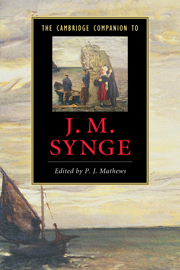Book contents
- Frontmatter
- Part 1 The Synge Texts
- 1 Re-thinking Synge
- 2 The Shadow of the Glen and Riders to the Sea
- 3 The Playboy of the Western World
- 4 The Well of the Saints and The Tinker’s Wedding
- 5 The Aran Islands and the travel essays
- 6 Deirdre of the Sorrows
- Part II Theorising Synge
- Part III Synge on stage
- Select bibliography
- Index
- Series List
4 - The Well of the Saints and The Tinker’s Wedding
from Part 1 - The Synge Texts
Published online by Cambridge University Press: 28 March 2010
- Frontmatter
- Part 1 The Synge Texts
- 1 Re-thinking Synge
- 2 The Shadow of the Glen and Riders to the Sea
- 3 The Playboy of the Western World
- 4 The Well of the Saints and The Tinker’s Wedding
- 5 The Aran Islands and the travel essays
- 6 Deirdre of the Sorrows
- Part II Theorising Synge
- Part III Synge on stage
- Select bibliography
- Index
- Series List
Summary
In John Millington Synge's dramas The Well of the Saints (1905) and The Tinker's Wedding (published 1907), peripatetic characters unconscious of ageing, sinfulness or ugliness live in a pre-lapsarian state that is disrupted by contact with the fallen realms of the Church and proprietorship. At the close of both, the by now tainted nomads reject any further dealings with the corrupting and implicitly entwined ideologies of capitalism and established religion and attempt to return to their original condition. The plays both centre on the loss of innocence of the wanderer foolish enough to initiate dealings with God's representative and the earthly values that he is ultimately seen to uphold. In a reversal of the folkloric associations of the rambler from which the plot of The Tinker's Wedding derives, worldliness is represented by the dogmatic churchmen and their nominally pious congregations, naivety and a genuine closeness to real divinity and pre-capitalist artlessness by the animistic peoples of the road. In short, despite their mythic echoes, both of these plays are deeply engaged with Revival-era debates on religious practices, economic transformation, and cultural difference, and constitute significant responses by Synge to the wider cultural shifts of late nineteenth-century Ireland. At the outset of The Well of the Saints, Mary and Martin Doul share an unselfconscious contentment, dwelling in what they alone perceive to be an Arcadian idyll.
- Type
- Chapter
- Information
- The Cambridge Companion to J. M. Synge , pp. 41 - 51Publisher: Cambridge University PressPrint publication year: 2009
- 1
- Cited by



